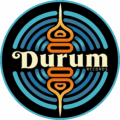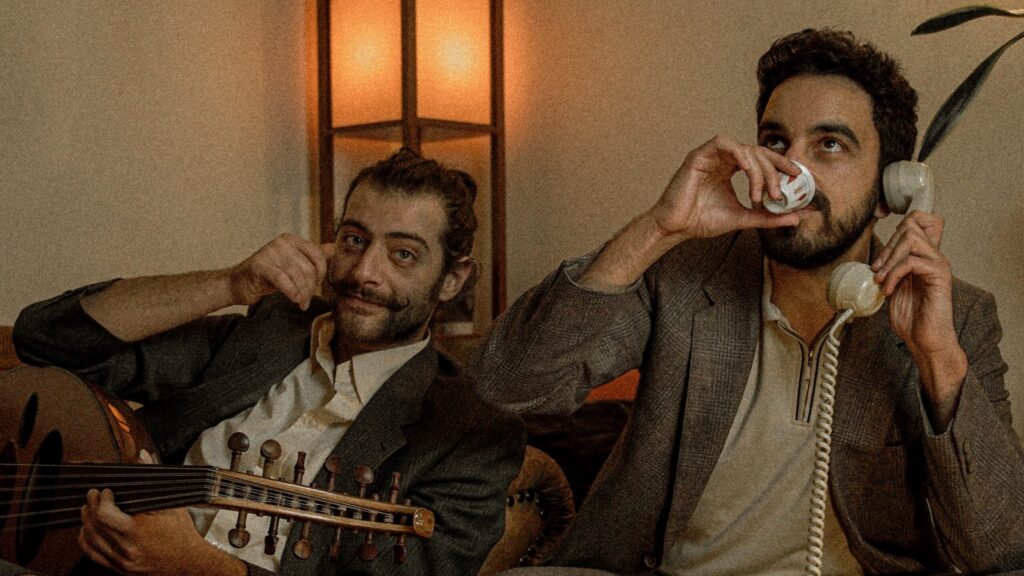Raised in Paris, but with Tunisian and Lebanese roots, Zajal is built on saz riffs, Arabic scales, and high-energy beats. They merge Middle Eastern vocals with raw electronics and live jam energy to create a sound that turns cultural heritage into club bangers that linger in your head for 1001 nights. We spoke with Bruno and Ruben about their roots, musical influences, and the magic moments on stage when everything clicks.
⸻
Introduction
What does ‘Zajal’ mean and how does it reflect you as a duo?
Zajal is a traditional form of improvised poetry from the Levant region. It’s a kind of poetic duel, like a rap battle. It’s a metaphor for how we perform live: facing each other, reacting, pushing each other further. And honestly, we also just liked the word. It’s short, catchy, and sounds good.
How would you describe your music to someone who’s never heard you before?
It’s a bridge between Middle Eastern folklore and modern electronic music. A mix of tradition and contemporary club sounds. But always with a joyful, energetic vibe. More like wedding music than moody deep house. There’s nothing broody or ambient about it. It’s made to party and celebrate.
⸻
Roots
How have your personal roots shaped your sound?
For both of us, Zajal is where we bring our cultural backgrounds and personal music tastes together. Ruben has Tunisian roots and a deep love for electronic music, especially house and techno. Bruno has a Lebanese background and used to play in high-energy Britpop bands with live instruments. With Zajal, we connect all these worlds in one sound: our personal music tastes, our heritage, and party energy.
What else has influenced your music?
We both grew up in the suburbs of Paris, where things often felt, as we say, sec. It literally means ‘dry’. It’s pure and raw. A lot of nights were just hanging out in parking lots with a guitar. That unpolished vibe stuck with us. In our music, we keep things intentionally raw, not overproduced. Think more underground mixtape than polished studio album.
What kind of instruments do you use in your live shows?
Bruno plays the saz – a Turkish string instrument – but plugged in and processed with effects, so it cuts through the mix like an electric guitar. He also plays keys, using custom plugins he built himself to play Arabic scales on Western synths. Ruben handles the drum machine, builds the beats live and manages the intensity of our tracks. Everything is played live and improvised. None of our shows is ever the same. We jam, we shift the energy, we break things down or build them up in the moment.
Do you write your own tracks, or work with samples?
It’s a mix. We often start with a traditional vocal and build a brand-new track around it from scratch. We write all the music ourselves, but keep the vocal sample to anchor it in something familiar. Even if the crowd doesn’t know us, people with Arabic backgrounds often recognize the samples and sing along – but others connect to the vibe too, it’s party material. The music feels both traditional and fresh, because of the spice we add to it.
⸻
Live
What do you want people to feel during a Zajal live set?
It’s a party. Always. We want people to move, to let go, to feel the energy. Sometimes it turns into a kind of trance – everything clicks, and there’s this shared momentum. That’s when the magic happens.
Are there live moments that really stuck with you?
One track always triggers a wild reaction: our remix of the Jewish classic Hava Nagila. We start at 120 BPM, slow it down to 60, then suddenly jump to 140. Every time, the room shifts – first swaying slowly, then exploding when the beat drops. It brings everyone together. That moment never fails.
⸻
Inspires
What’s next for Zajal?
This year we want to release more tracks and work with more collaborators – singers, instrumentalists, whoever fits the vibe. Instead of only sampling, we want to create new original tracks together. And we’re aiming for bigger festivals – more visibility, more people, more energy. That’s the plan.

